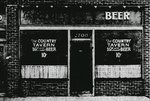

With this week’s cover story covering the reopening of the remodeled Mac’s Bar, what better time to dig into the back story of the notorious location at 2700 E. Michigan Ave., Lansing?
Mac’s Bar has been rooted in the east side’s nightlife legacy for decades. And while its current owner, Chuck Mannino, has maintained the venue’s punk-rock edge over the last 15-plus years with countless rock shows, the club’s gritty roots go back to its original owner, the late Clare “Mac” McKenzie.
Originally opened as The Country Tavern, the building was initially owned by Mike and Jane Fabiano — the married couple, then newlyweds, opened up shop in 1936. The family (later known for Fabiano’s Candies) and the Country Tavern management team first got into the beer business after the abolishment of prohibition. The saloon served up its bestsellers on tap: Schlitz, Eckert, Beck and Old Brew. Of course, it stocked plenty of bottled brews, as well.
Though after McKenzie bought the brick structure, he rebranded it after his nickname: “Mac.” The name stuck. Decades later, it’s still an institution.
But who was “Mac”? A trail of old news articles, print ads and police reports left behind tell some of his stories. McKenzie was a Grand Rapids native who moved to Lansing in the early 1930s. During the height of World War II, he managed local supply stores for the Nash-Kelvinator plant, which (during the war) produced aeronautic parts for the Arsenal of Democracy.
Though the entrepreneur inside called, and he opened The Rock Barbecue at 3100 S. Cedar. The hotspot was best known for its tasty “country style” chicken and celebrated ribs. All the while, he started a family with his wife, Margaret. The couple had one son, Hugh. When McKenzie wasn’t busy placing beer orders or raising his son, he was also an active member of Masonic groups, was the Ingham County Table Top director, and participated in outfits, such as the Knights of Templar. In 1941, he even ran as an independent candidate on the Republican ticket for the Lansing Township Clerk. He was a well-known local mover and a shaker.
After purchasing 2700 E. Michigan Ave. in the early-1940s, McKenzie made numerous Lansing State Journal headlines for Mac’s ongoing “selling liquor to minors” troubles with the Liquor Control Commission. Most often, these often resulted in $150 fines. Other press noted a long history of patron debauchery at the property, such as brawls, robberies and assorted petty crimes. In 1960, a 25-year-old was jailed following a fight. The cause? A drunken college student was refused a drink because it was 2 a.m. In protest, the man climbed on the bar and set the clock back to 1:58. A fight with another patron ensued. Police were called, and suspects were booked.
After around 20 years of operating Mac’s Bar, at age 61, Clare D. McKenzie died March 27, 1962, after a Leukemia battle he’d fought since 1957. He died in Florida, where he and his wife had spent winters since 1961. Here in Greater Lansing, the McKenzies last lived on Van Atta Road, but they’d head south to Pompano Beach, Florida, to escape the cold. In December 1961, the Red Cross hosted a special blood drive for McKenzie, who underwent frequent blood transfusions during his final months. He was buried at Evergreen Cemetery. It’s only right that thee “Mac” is laid to rest here in Lansing, where his namesake lives on.
Support City Pulse - Donate Today!
Comments
No comments on this item Please log in to comment by clicking here